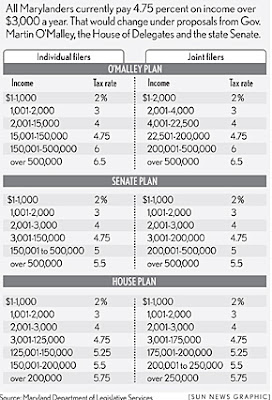Embattled Senate Budget and Taxation (B&T) Chairman Ulysses Currie (D-25) is raising money again. Is that good or bad for Democrats?
Senator Currie, who has headed the B&T Committee since 2002, has been one of the Democrats' most prolific fundraisers. He has collected $919,083.76 in contributions since 1999, third in the legislature behind Senate President Mike "Big Daddy" Miller ($2,568,861.98) and Speaker of the House Mike Busch ($1,673,431.22). But Currie's take slowed down dramatically last year after his home was raided by the FBI and revelations emerged concerning his relationship with Shoppers Food & Pharmacy. In 2008, Currie collected a mere $18,173.48 (not counting any proceeds of his legal defense fund) as he and his donors largely avoided each other. But Currie is back on the rubber-chicken trail, announcing a Greenbelt fundraiser featuring tables of ten for a cool $2,500 each.
The B&T Chair is an enormous financial boon for its holder because of its jurisdiction, which includes "legislation relating to State operating and capital budgets, including revenues, expenditures, and supplementary appropriations; legislative budgetary procedures; State and county bond authorizations; taxation and property assessments; education financing; and pension and retirement matters." Anyone lobbying a tax measure must go through the Chairman. That means not having a Chairman who can raise money is a lost opportunity for state Democrats.
Why? The reason is that Currie's money has been distributed far and wide. The Senator has contributed $212,092.19 to other candidates and PACs since 1999. The biggest recipients include the Community Coalition Advocacy Slate ($25,000) - a slate for Prince George's Senators - the 25th District Team ($10,800), the Democratic State Central Committee of Maryland ($5,250), Baltimore City Council Chairwoman Stephanie Rawlings-Blake ($5,000), Prince George's County Executive Jack Johnson ($4,000), Baltimore City Senator Lisa Gladden ($3,000), former Baltimore City Senator Ralph Hughes ($3,000) and Governor Martin O'Malley ($2,000). But the single largest recipient of Currie's money has been the Democratic Senatorial Committee Slate, to which Currie has contributed $155,000.
The latter slate is extremely important to Democratic Senators. It is controlled by the Senate leadership and is used to aid vulnerable incumbents, especially ones facing tough GOP challengers. It has spent $1.5 million since 1999 helping the Democrats. Among its biggest expenditures have been:
$302,248.92 on "printing and campaign materials" on 11/1/06.
$119,958.24 on "direct mailing by mail house" on 10/16/02.
$53,040.00 on "media (radio, T.V., newspaper, billboards)" on 10/25/06.
The fund also transfers large sums of money directly to Democratic candidates. Senate challenger Walter Shandrowsky received donations of $20,000 on 9/23/06 and $75,000 on 10/27/06 to help him against Bryan Simonaire in an Anne Arundel open seat race. (Simonaire still won.) Incumbent Kathy Klausmeier of Baltimore County received $45,000 on 11/1/06 to help her successfully turn back a Republican challenger. Many other Democratic candidates have received less than $10,000, often in the late stages of races.
Several Democratic Senators will face vigorous GOP challenges and more than one seat will open up next year. That means the need to leverage the B&T Chair to finance the Democratic Senatorial Committee Slate will be pressing indeed. But if Currie gets indicted and his money is spread to the slate - and thenceforth to other Democrats - will it be worth it? The Lords of Annapolis need to think long and hard about this.
Below is Currie's solicitation.


Read More...
Summary only...




